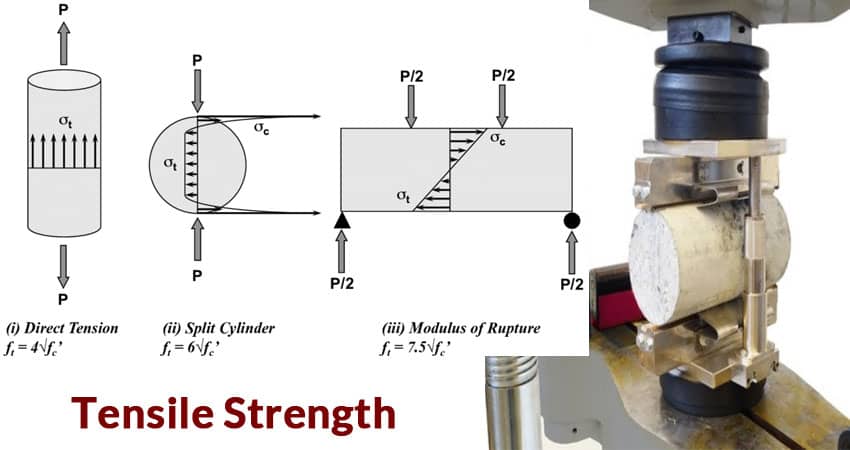Tensile Strength of Concrete Test

In the field of construction, Concrete is one of the most used and versatile building materials used in various types of structures such as bridges, buildings, dams, roads, stadiums, etc. Concrete can be considered the second-most-used substance in the world after water. Without the use of concrete no modern structure can be built.
Tensile Strength is defined as the ability of a material to resist tearing, it is the maximum load that a material can hold without breaking while being stretched.
There is a universal line that "Concrete is good in compression and weak in Tension" and there are some reasons behind it. Determining the tensile strength of concrete is necessary to understand the extent of any possible damage due to the stretch.
Breaking and cracking start to arise when the tensile forces surpass the tensile strength. The Tensile strength of the concrete has a range between 10% to 12% of its binding strength.
Why Is The Tensile Strength of Concrete Crucial?
Tensile Strength is considered to get the best-desired value of concrete. The tensile strength plays a fairly large part that contributes to the design. If the Tensile strength is not measured correctly the construction project can be affected and will not stand the test of time and may also lead to accidents. Tensile Strength is the dominating factor in crack control and contributes to avoiding cracks.
Why is concrete weak in tension?
Concrete is not a single solid material like steel or aluminium which are strong in both compression and tension. It is rather manufactured by mixing cement, water and some admixtures as well, it makes up into a fine aggregate and coarse aggregate. Each of the materials present in the making of the concrete possesses different properties which result in the properties of concrete as a whole.
If observing the microstructure of the concrete it can be seen that the concrete consists of the weakest link in the structure which is known as Interface Transition Zone in concrete.
Factors Affecting Tensile Strength Test of Concrete
The various factors affecting the tensile strength of concrete are as follows
- Curing of the concrete
- The quality of materials used to manufacture the concrete
- Temperature
- Aggregate water-cement ratio
- Respective Humidity
- Fineness of Cement
- Admixtures
- Coarse to fine aggregate ratio
The rate of application and the range of load also affects the strength results of the concrete. The state of moisture content of the concrete also affects the strength of the concrete to some extent.
Tensile Strength of Concrete Test Methods
The following test methods can be determined for the tensile strength of concrete.
- Uniaxial Tensile Test : It is one of the most commonly used tests to determine the tensile test. It is a direct tension test in which the concrete specimen is held at the ends and then pulled apart, including uniaxial tensile stress present in it.
- Split Cylinder Test : To perform this test a concrete cylinder is placed horizontally between loading surfaces and loaded forward to its diameter.
- Flexural Strength Test : Flexural strength of the concrete is described as the ability of the slab or concrete beam to resist failure in bending. The concrete specimen cracks due to tensile stresses included in the underneath fibers under pure bending.
Conclusion
The knowledge and calculation of the Tensile Strength of Concrete are important to have as this is a very plays an important factor in the durability of any kind of project.
To get more details, watch the following video tutorial.
